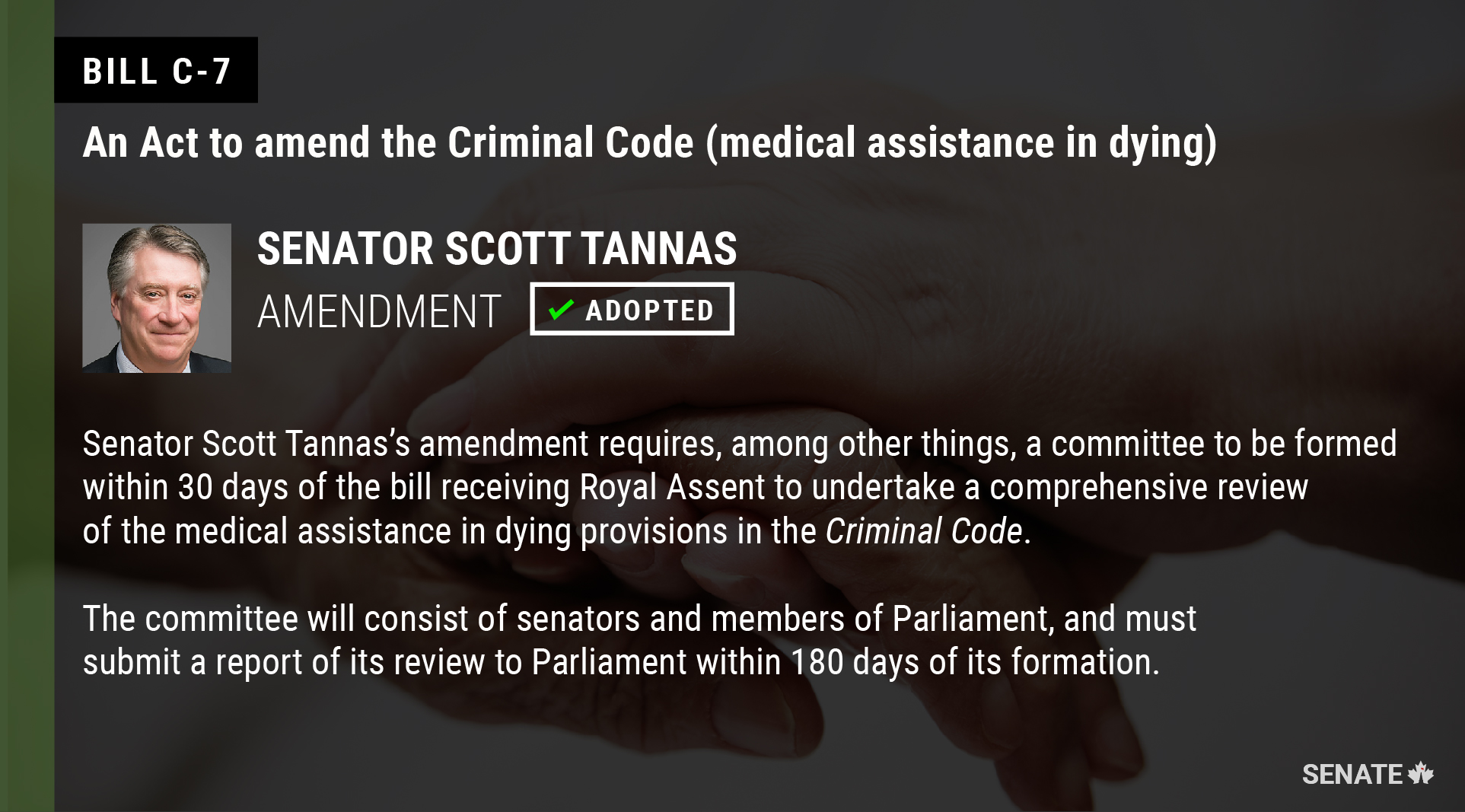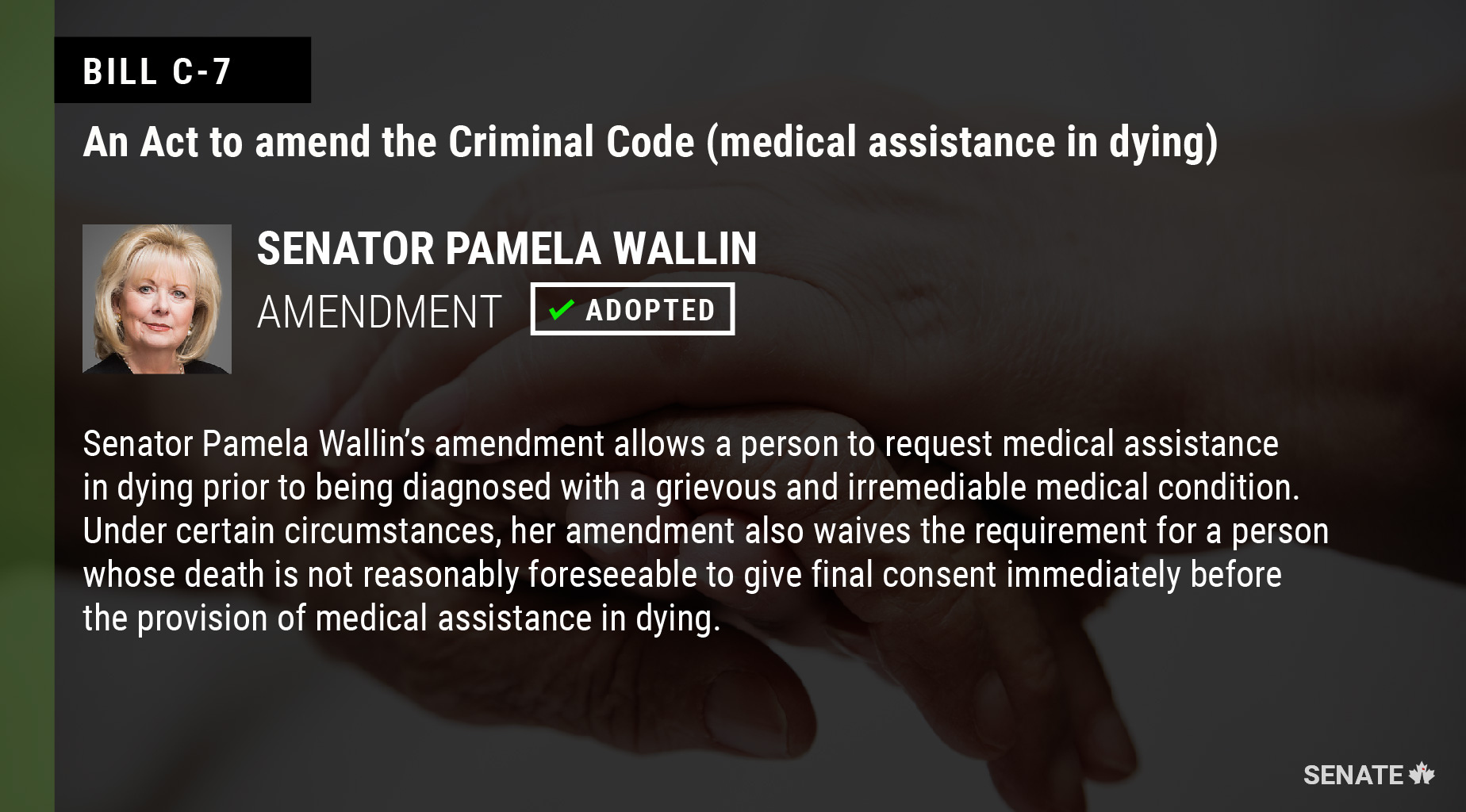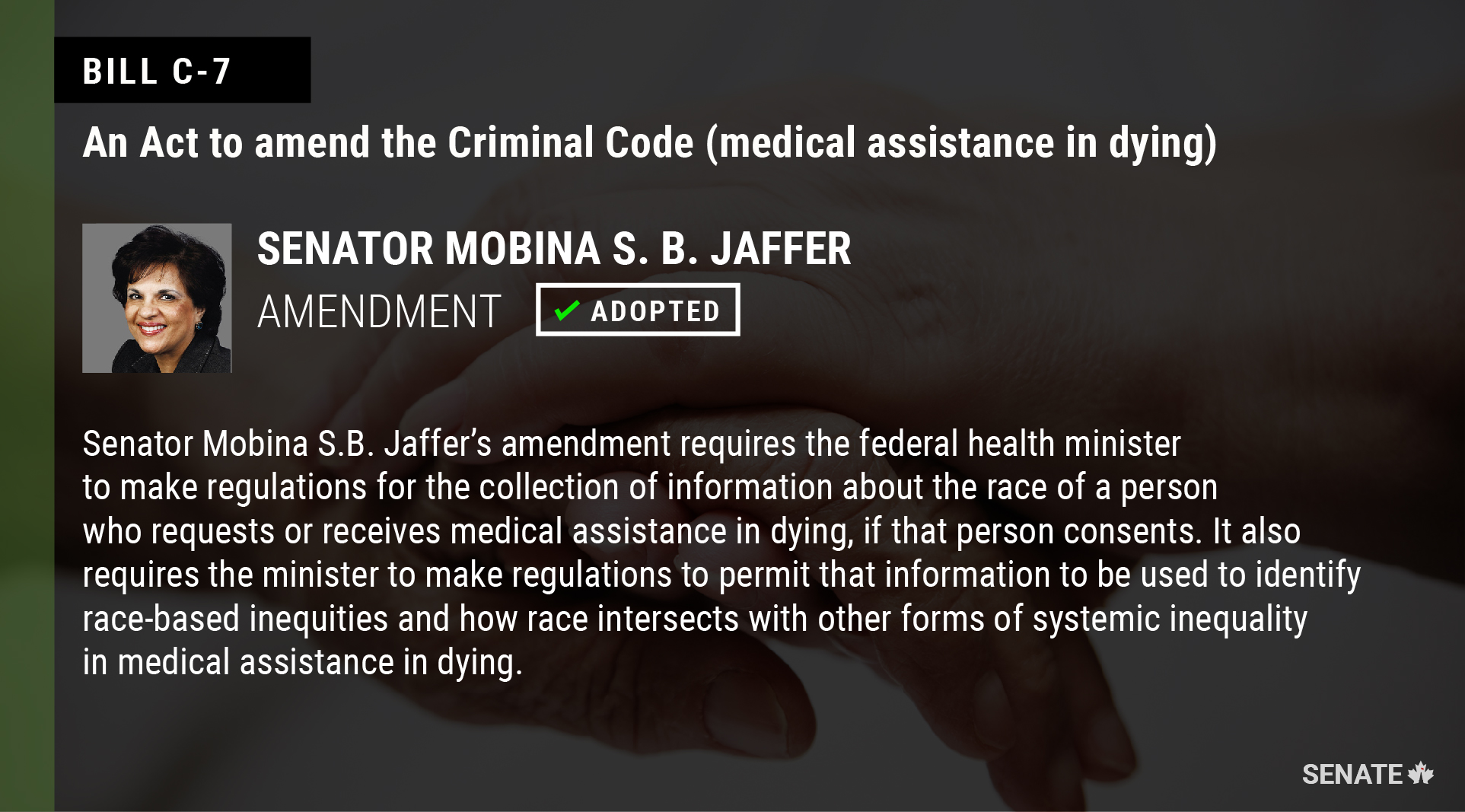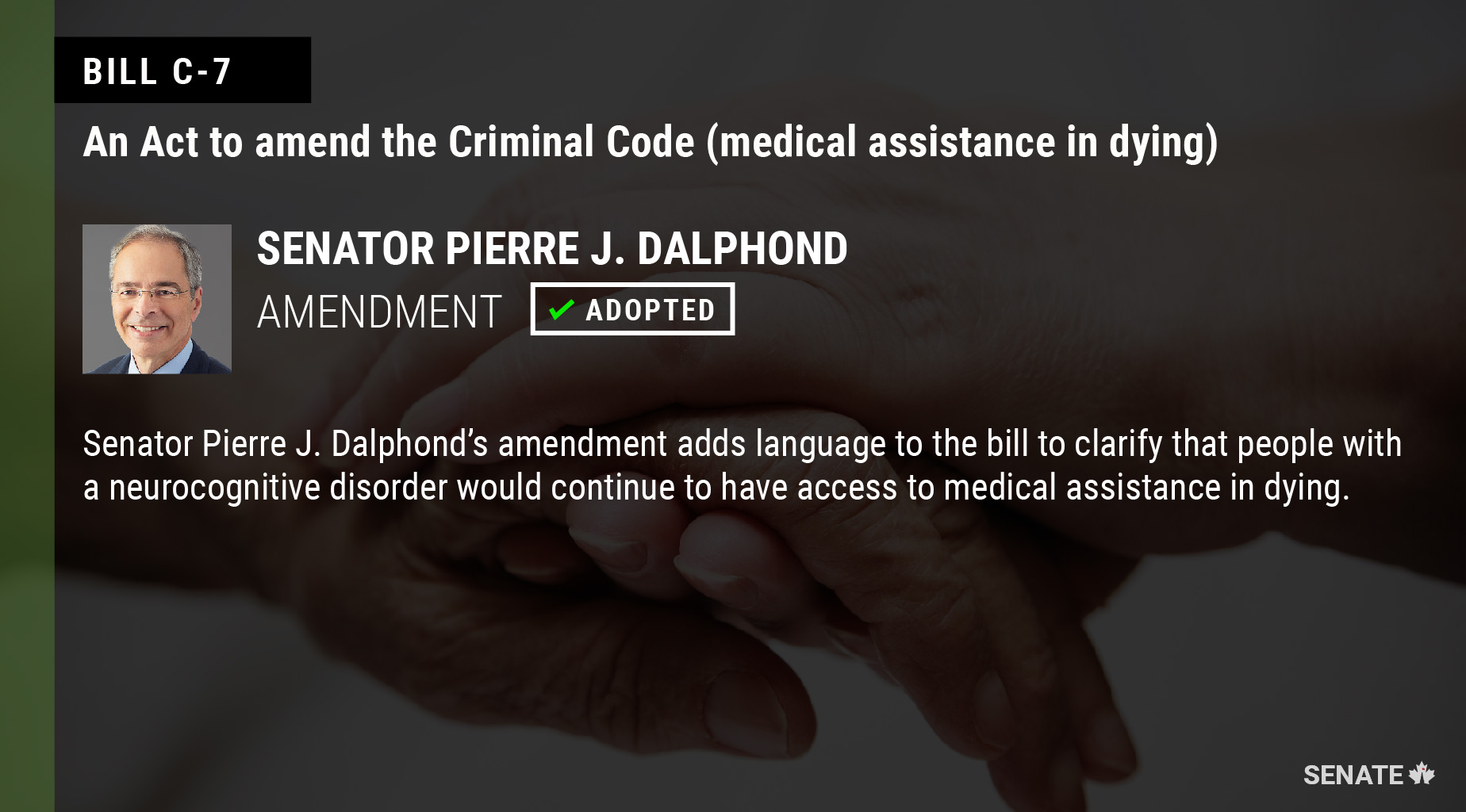The medical assistance in dying bill in the Senate

Bill C-7, An Act to amend the Criminal Code (medical assistance in dying), would bring Criminal Code provisions governing medical assistance in dying into compliance with a Quebec court decision that found some current provisions to be unconstitutional.
On June 17, 2016, a bill legalizing medical assistance in dying received Royal Assent. Provisions of Bill C-14, An Act to amend the Criminal Code and to make related amendments to other Acts (medical assistance in dying), were subsequently challenged in court.
On September 11, 2019, Quebec Superior Court Justice Christine Baudouin ruled that restricting eligibility for medical assistance in dying to people whose natural death is reasonably foreseeable violates the Canadian Charter of Rights and Freedoms. Justice Baudouin gave the federal government six months to change the law before her ruling came into effect; the government asked for and received extensions and now has until March 26, 2021 to change the law.
The bill also makes changes to the law beyond the issues raised by Justice Baudouin.
TIMELINE
February 6, 2015
The Supreme Court rules in Carter v. Canada (Attorney General) that Criminal Code prohibitions on assisted dying “are of no force or effect to the extent that they prohibit physician-assisted death” for a competent, consenting adult with an irremediable medical condition that is causing enduring and intolerable suffering.
February 25, 2016
Senators and MPs on the Special Joint Committee on Physician-Assisted Dying present the committee’s report, Medical Assistance in Dying: A Patient-Centred Approach. The committee makes 21 recommendations, including that “medical assistance in dying be available to individuals with terminal and non-terminal grievous and irremediable medical conditions that cause enduring suffering that is intolerable to the individual in the circumstances of his or her condition [emphasis added].”
April 14, 2016
Bill C-14, An Act to amend the Criminal Code and to make related amendments to other Acts (medical assistance in dying), is introduced at first reading in the House of Commons. It proposes to allow access to medical assistance in dying to individuals with a “grievous and irremediable medical condition.” One of the criteria used to determine whether a person has a grievous and irremediable medical condition is that the person’s “natural death has become reasonably foreseeable.”
June 15, 2016
Bill C-14 passes third reading in the Senate after senators make a number of amendments — including an amendment by then-senator Serge Joyal to remove the reasonably foreseeable death criterion. Since a bill must pass both houses of Parliament in identical form before it can become law, members of the House of Commons must vote on the Senate amendments.
June 16, 2016
MPs accept some Senate amendments but reject the amendment to remove the reasonably foreseeable death criterion. The justice minister tells the House she is “confident” the bill is nevertheless constitutional.
June 17, 2016
Then-senator André Pratte says he is convinced that keeping the reasonably foreseeable death criterion is a “serious and cruel mistake” and expresses hope that “the courts will remedy that mistake.” The Senate chooses not to insist on its amendments; the bill receives Royal Assent and becomes law.
September 11, 2019
The Superior Court of Quebec rules in Truchon c. Procureur général du Canada that the reasonably foreseeable death criterion violates the Canadian Charter of Rights and Freedoms and declares that part of the law to be of no force and effect. The judge suspends her declaration of invalidity to give the government time to change the law.
February 24, 2020
The federal government introduces a bill to amend the medical assistance in dying regime.
August 18, 2020
The bill dies on the order paper when Parliament is prorogued.
October 5, 2020
The federal government introduces Bill C-7, An Act to amend the Criminal Code (medical assistance in dying).
November 3, 2020
The Senate Committee on Legal and Constitutional Affairs is authorized by the Senate to study Bill C-7 before it arrives in the Senate.
November 23, 2020
The legal committee holds its first meeting about Bill C-7, which includes an appearance by federal Justice Minister David Lametti.
December 10, 2020
The bill passes the House of Commons and is introduced in the Senate.
December 17, 2020
The Superior Court of Quebec grants the government another extension, this time to February 26, 2021. In the Senate, the bill is adopted at second reading and referred to the Senate Committee on Legal and Constitutional Affairs.
February 8, 2021
The Senate Committee on Legal and Constitutional Affairs reports the bill to the Senate without amendment. Debate at third reading begins.
February 17, 2021
The Senate adopts the bill at third reading, with amendments.
February 23, 2021
Debate begins in the House of Commons on the Senate’s amendments.
March 15, 2021
Debate begins in the Senate on the House of Commons’ response to the Senate’s amendments.
March 17, 2021
The Senate accepts the House of Commons’ response to the Senate’s amendments.
The bill receives Royal Assent.
TRUCHON DECISION
Quebec Superior Court Justice Christine Baudouin ruled in Truchon c. Procureur général du Canada that provisions of the medical assistance in dying regime are unconstitutional.
Plaintiffs Jean Truchon and Nicole Gladu suffered from incurable medical conditions that significantly affected their quality of life.
Mr. Truchon — paralyzed from birth except for one arm — was diagnosed with a degenerative condition that cost him the use of his functioning arm, forced him into a care facility and left him in constant pain.
Ms. Gladu was diagnosed with a syndrome arising from childhood polio that left her in constant pain as well. “Every breath is a battle,” Justice Baudouin wrote.
The plaintiffs were nevertheless declared ineligible for medical assistance in dying because their natural deaths were not “reasonably foreseeable, taking into account all of their medical circumstances.” They argued this violated their rights to equality and to life, liberty and security of the person as set out in the Canadian Charter of Rights and Freedoms.
The court agreed.
The reasonably foreseeable death criterion “denies persons who are disabled and grievously ill the right to make fundamental decisions, and this, out of a desire to protect them,” Justice Baudouin wrote. “By seeking to protect them from themselves … the state is sending the message that it does not consider them to be persons truly capable of making decisions.”
She was particularly horrified by Mr. Truchon’s evidence that he considered starving himself to end his life.
“He knows that it is a long process, that it causes terrible suffering,” the judge wrote. She called it “repugnant” that people like Mr. Truchon should be forced to resort to starvation to end their lives.
“While the law as drafted does not force the applicants to live, it nonetheless forces them to choose between suffering, suffering even more, or committing suicide,” she wrote.
“The applicants have always fully lived their lives with a physical disability. What they are truly seeking is for the law to recognize equally the suffering, dignity and, ultimately, the autonomy of people like themselves who have grievous and irremediable medical conditions, without hierarchy and regardless of whether or not death is imminent.”
Justice Baudouin declared that the reasonably foreseeable death requirement violated the Charter but suspended the declaration of inapplicability, giving the federal government time to change the law.
The judge, however, allowed the plaintiffs to receive medical assistance in dying before the law is changed. Mr. Truchon died with assistance in a Montreal-area long-term care facility on April 7, 2020. Ms. Gladu is still living.
“The court will remain forever marked by their testimony,” Justice Baudouin wrote, “and wishes [to] express its deepest respect for them.”
THE BILL
Reasonably foreseeable natural death
Bill C-7 would repeal the reasonably foreseeable natural death requirement that the Superior Court of Quebec found to be unconstitutional.
Section 241.2 of the Criminal Code outlines the criteria that must be met for a person to be eligible for medical assistance in dying. One of those criteria is that the person must have a “grievous and irremediable medical condition.”
Subsection 241.2 (2) currently says that a person has a grievous and irremediable medical condition “only if” they meet four criteria:
- They have a serious and incurable illness, disease or disability
- They are in an advanced state of irreversible decline in capability
- Their illness, disease, disability or state of decline causes intolerable and enduring physical or psychological suffering that cannot be relieved under conditions they consider acceptable
- Their natural death has become reasonably foreseeable, taking into account all of their medical circumstances, without a prognosis necessarily having been made as to the specific length of time that they have remaining.
Bill C-7 would repeal the last criterion.
Mental illness
The bill establishes that medical assistance in dying is not available to people suffering solely from a mental illness. It adds language specifying that mental illness “is not considered to be an illness, disease or disability” for the purposes of subsection 241.2 (2) of the Criminal Code, as outlined above.
Safeguards — when natural death is reasonably foreseeable
The bill would remove the 10-day waiting period between the signing of a request for medical assistance in dying and the day that assistance is provided.
It would replace the waiting period with a requirement that people who have difficulty communicating be provided with a reliable means to relay their decision to seek medical assistance in dying and to understand information provided to them.
Safeguards — when natural death is not reasonably foreseeable
The bill would introduce a 90-day waiting period for people whose natural death is not reasonably foreseeable. This waiting period could be shortened if the medical practitioner and nurse practitioner are of the opinion that the person seeking an assisted death may soon lose the capacity to consent.
Patients would also have to be informed of other means available to relieve suffering and be offered consultations with professionals who can provide these services. In addition, medical personnel would have to discuss these means with the patient and agree that the patient had seriously considered them.
Consent
Currently, medical personnel must confirm the consent of the person seeking an assisted death immediately before providing that assistance.
For a person whose death is reasonably foreseeable, Bill C-7 would allow medical personnel to proceed without confirming consent if, among other things:
- The person had lost the capacity to consent
- The person had entered into a written agreement that assistance in dying would be provided on a specific day
- The fatal substance is administered in accordance with the terms of the agreement.
Monitoring
Bill C-7 would impose a more rigorous monitoring regime for medical assistance in dying by placing new reporting requirements on medical and pharmacy staff who are involved in medical assistance in dying cases and by expanding the scope of information they are required to submit to Health Canada.
For more information, the Library of Parliament has prepared a detailed legislative summary of Bill C-7.
Progress through Parliament


In the Chamber
Third Reading
The committee reported the bill without amendment on February 8, 2021; debate at third reading began later that day. The Senate adopted a motion to group third reading debate into themes:
- Mental illness and degenerative illness
- Safeguards and advance requests
- Vulnerable and minority groups, health care (including palliative care) and access to medical assistance in dying
- Conscience rights
- Review process and the coming into force of the legislation.
The Senate adopted the bill at third reading, with amendments, on February 17, 2021.

In committee
LCJC - Legal and Constitutional Affairs
On November 3, 2020, the Senate Committee on Legal and Constitutional Affairs was authorized by the Senate to pre-study Bill C-7. The committee released a report on the bill on December 10, 2020.
The bill was referred to the committee after it was adopted at second reading on December 17, 2020.
The committee completed its study on February 3, 2021 and adopted the bill without amendment on division. The committee reported the bill to the Senate on February 8, 2021.
Meetings

Amendments







